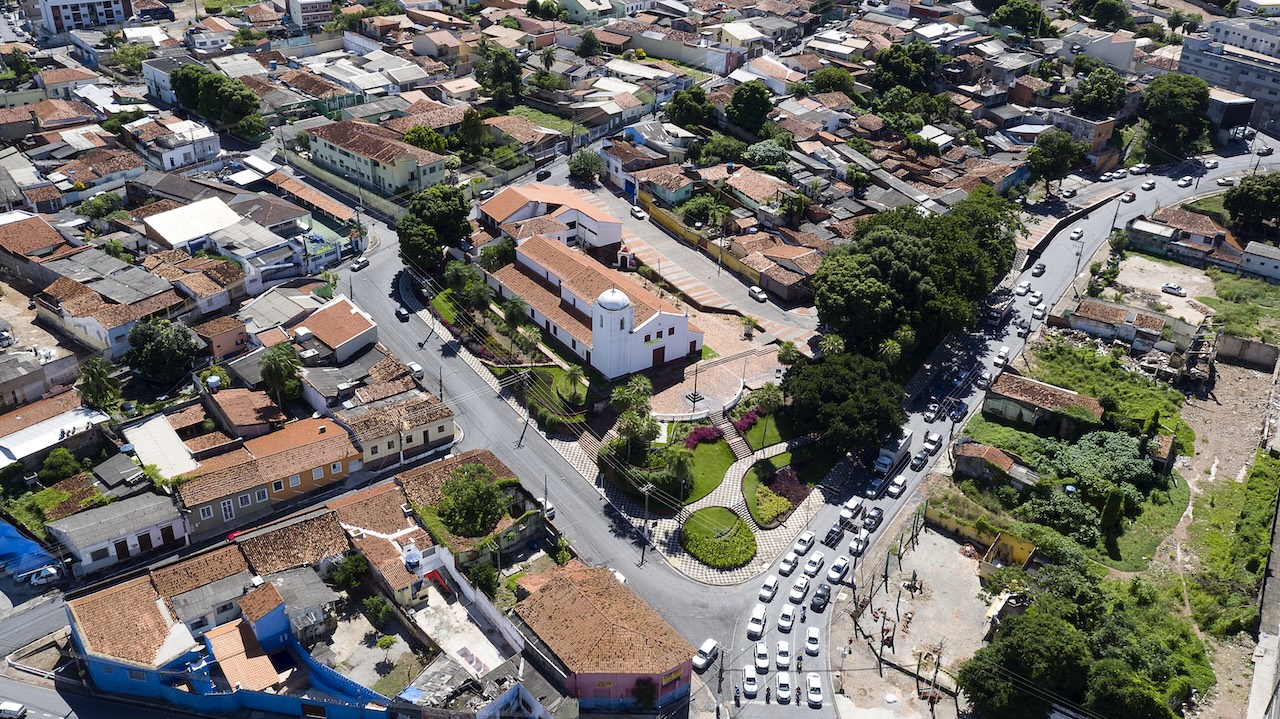Cuiabá - MT
Basic Information
- Population: 650,877
- GDP per capita: BRL 42,918.31
- MHDI: 0.785
- Source: IBGE
Cuiabá is located in the state of Mato Grosso, in the Center-West Region of the country. Those born in Mato Grosso are mato-grossense. Those born in Cuiabá are Cuiabanos. Uniting history and nature in a unique spectacle, its cultural roots are reflected in festivals and folkloric events, and the Cuiabá River meanders through the city providing stunning scenery. With its regional cuisine, the capital enchants visitors with its authenticity and human warmth. Cuiabá is a gateway to the natural wealth of the Pantanal and will host G20 activities.

Introduction
Cuiabá has an area of 4,327.448 km2 and is the capital of the state of Mato Grosso. The city is an enchanting fusion of culture, history and exuberant nature. Founded in 1719, its roots go back to the Gold Cycle, influencing the colonial architecture of the historic center. In addition, it is bathed by the waters of the Cuiabá and Coxipó rivers, revealing a unique atmosphere with its rich cultural heritage and the human warmth of the population.
Cuiabá's architecture is a testimony to the past and present. In the center, buildings such as the Church of Nossa Senhora do Rosário (Our Lady of the Rosario) and São Benedito (St. Benedict), dating from the 18th century, stand out. The colorful houses and baroque churches lend a peculiar charm to the historic streets, while modern buildings reflect the city's contemporary growth.
Cuiabá's natural beauty is marked by its proximity to the Pantanal, the largest floodplain in the world. The Pantanal's unique flora and fauna attract tourists in search of a wild and authentic experience. Chapada dos Guimarães National Park, with its rock formations and waterfalls, is another natural treasure that complements the region's landscape.
Cuiaban culture is celebrated in festivals and events throughout the year. The Siriri and Cururu Festival highlights typical dances and music, while São Benedito, the city's patron saint, is honored with religious and folkloric festivities. Mercado do Porto (Harbor Market), with its metallic architecture, is a meeting point where Cuiaban culture mixes with traditional commerce.
The local cuisine is an attraction in itself, with typical dishes from the region offering visitors a true gastronomic experience. The pintado fish, the traditional rice with pequi and the famous Maria Isabel, a kind of carreteiro rice with beef, are dishes that show the diversity and richness of Cuiabá cuisine.
Cuiabá's climate is tropical, with well-defined seasons. Summers are hot and humid, ideal for exploring the region's natural beauty. In winter, temperatures are mild, with a pleasant climate for outdoor activities.
The capital is a treasure of the Brazilian Midwest region. The historic architecture, the natural beauty of the Pantanal, the cultural richness and the authentic cuisine converge to create a unique experience. With its welcoming and vibrant soul, Cuiabá invites visitors to explore its traditions and the natural wonders that surround it.
Main tourist attractions
• Cuiabá Metropolitan Cathedral
• Historical Museum of Mato Grosso
• Cuiabá Municipal Market
• Tia Nair Park
• Morro da Luz
• Rondon Memorial
• Casa do Artesão – Crafting Home
• Alencastro Square
• Praça das Bandeiras - Flag Square
24 HOURS IN CUIABÁ
MORNING
Mercado do Porto is one of Cuiabá's most traditional markets. There you can find a wide variety of local products, such as fruit, vegetables, fresh fish, handicrafts and spices. It's also a great place to try authentic Cuiabá cuisine.
LUNCH
Cuiabana cuisine is a unique blend of indigenous, African and European influences. Try the region's typical dishes, such as Maria Isabel (rice with sun-dried meat), pacu roasted in banana leaves, the famous pintado fish and the incomparable rice with pequi.
AFTERNOON
As one of the closest cities to the Pantanal, Cuiabá is an ideal base for exploring this incredible area of biodiversity. Boat trips, hikes, photo safaris and bird watching are some of the activities you can enjoy in this unique ecosystem.
LATE AFTERNOON/EVENING
Look out for events or performances that celebrate Afro-Brazilian music and dance in Cuiabá. You can attend capoeira shows and folkloric dances, such as siriri and cururu, and even take part in workshops to learn the traditional moves.
Airport
Cuiabá – Marechal Rondon International Airport, located in Várzea Grande, just 8 km from the city center, has the capacity to handle 5.7 million passengers per year. The airport is a gateway to the rich biodiversity of the Pantanal and the vibrant culture of Mato Grosso. With modern infrastructure, it facilitates access to tourist destinations in the central region of Brazil.
Sites
Government of the State of Mato Grosso
https://www.visitecuiaba.com.br/
G20 events in Cuiabá
Click here to see the full calendar